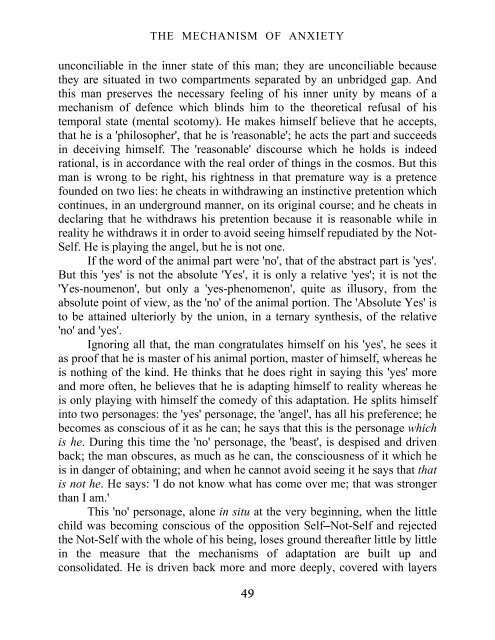The Supreme Doctrine - neo-alchemist
The Supreme Doctrine - neo-alchemist
The Supreme Doctrine - neo-alchemist
You also want an ePaper? Increase the reach of your titles
YUMPU automatically turns print PDFs into web optimized ePapers that Google loves.
THE MECHANISM OF ANXIETY<br />
unconciliable in the inner state of this man; they are unconciliable because<br />
they are situated in two compartments separated by an unbridged gap. And<br />
this man preserves the necessary feeling of his inner unity by means of a<br />
mechanism of defence which blinds him to the theoretical refusal of his<br />
temporal state (mental scotomy). He makes himself believe that he accepts,<br />
that he is a 'philosopher', that he is 'reasonable'; he acts the part and succeeds<br />
in deceiving himself. <strong>The</strong> 'reasonable' discourse which he holds is indeed<br />
rational, is in accordance with the real order of things in the cosmos. But this<br />
man is wrong to be right, his rightness in that premature way is a pretence<br />
founded on two lies: he cheats in withdrawing an instinctive pretention which<br />
continues, in an underground manner, on its original course; and he cheats in<br />
declaring that he withdraws his pretention because it is reasonable while in<br />
reality he withdraws it in order to avoid seeing himself repudiated by the Not-<br />
Self. He is playing the angel, but he is not one.<br />
If the word of the animal part were 'no', that of the abstract part is 'yes'.<br />
But this 'yes' is not the absolute 'Yes', it is only a relative 'yes'; it is not the<br />
'Yes-noumenon', but only a 'yes-phenomenon', quite as illusory, from the<br />
absolute point of view, as the 'no' of the animal portion. <strong>The</strong> 'Absolute Yes' is<br />
to be attained ulteriorly by the union, in a ternary synthesis, of the relative<br />
'no' and 'yes'.<br />
Ignoring all that, the man congratulates himself on his 'yes', he sees it<br />
as proof that he is master of his animal portion, master of himself, whereas he<br />
is nothing of the kind. He thinks that he does right in saying this 'yes' more<br />
and more often, he believes that he is adapting himself to reality whereas he<br />
is only playing with himself the comedy of this adaptation. He splits himself<br />
into two personages: the 'yes' personage, the 'angel', has all his preference; he<br />
becomes as conscious of it as he can; he says that this is the personage which<br />
is he. During this time the 'no' personage, the 'beast', is despised and driven<br />
back; the man obscures, as much as he can, the consciousness of it which he<br />
is in danger of obtaining; and when he cannot avoid seeing it he says that that<br />
is not he. He says: 'I do not know what has come over me; that was stronger<br />
than I am.'<br />
This 'no' personage, alone in situ at the very beginning, when the little<br />
child was becoming conscious of the opposition Self─Not-Self and rejected<br />
the Not-Self with the whole of his being, loses ground thereafter little by little<br />
in the measure that the mechanisms of adaptation are built up and<br />
consolidated. He is driven back more and more deeply, covered with layers<br />
49




